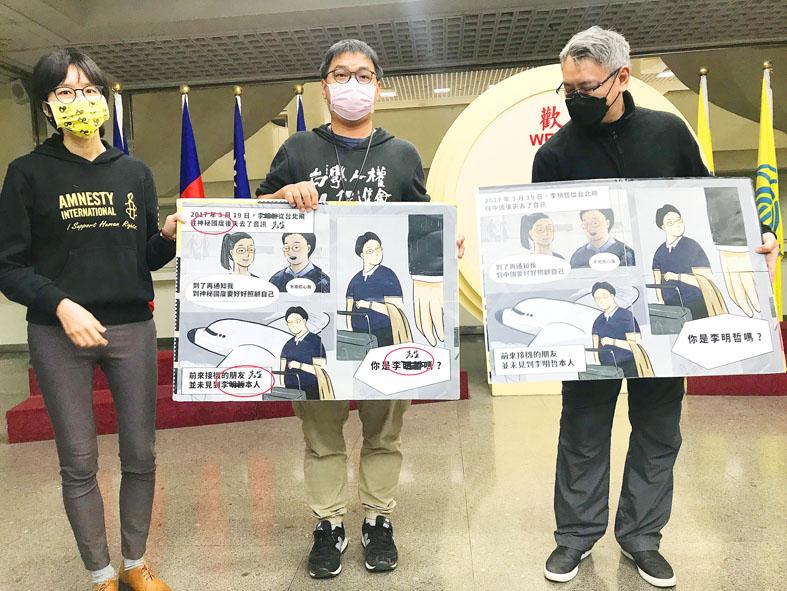Human rights advocates and several Taipei city councilors yesterday accused Taipei Rapid Transit Corp (TRTC, 臺北捷運) of political censorship, after it reportedly rejected an advertisement that mentioned “China” and “Lee Ming-che” (李明哲).
Amnesty International Taiwan had planned to post a comic advertisement on Taipei’s MRT lines on Human Rights Day, Dec. 10, to increase public awareness about Lee, a human rights advocate who has been detained in China since 2017, association secretary-general Chiu E-ling (邱伊翎) said.
However, before it would approve its use, the company asked the association to remove “China” and Lee’s name from the advertisement, she said.

Photo: CNA
The company is a state-run enterprise that receives more than 70 percent of its funding from the Taipei City Government, but it rejected an advertisement by Amnesty International, Taiwan Association for Human Rights secretary-general Shih Yi-hsiang (施逸翔) said.
The advertisement should be protected because Taiwan ratified the International Covenant on Civil and Political Rights, which says: “Everyone shall have the right to freedom of expression; this right shall include freedom to seek, receive and impart information and ideas of all kinds, regardless of frontiers, either orally, in writing or in print, in the form of art or through any other media of his choice,” Shih said.
The company had approved Amnesty International’s “write for rights” advertisement, but not its “write to Lee Ming-che” advertisement, despite the two being similar campaigns, independent Taipei City Councilor Lin Liang-jyun (林亮君) said.
This shows the widespread political censorship that the company exercises over advertisements, which has harmed freedom of expression and the advertising market, she said.
Taipei Mayor Ko Wen-je (柯文哲) frequently says that Taipei is free and democratic, but his actions show the contrary, independent Taipei City Councilor Lin Ying-meng (林穎孟) said, adding that Ko appears to be covering up for China, which is persecuting Lee.
Independent Taipei City Councilor Huang Yu-feng (黃郁芬) said that the company’s advertisement standards are inconsistent.
On the one hand, it rejected the advertisement about Lee due to its politically motivated content, while on the other, it allowed advertisements that hype Ko’s political performance, she said.
The company’s internal advertisement review committee did not detail its reasons for turning down the “write to Lee Ming-che” advertisement, but kept asking Amnesty International Taiwan to revise the content due to a “controversial political issue,” independent Taipei City Councilor Chiu Wei-chieh (邱威傑) said.
TRTC said that the review committee has 13 members, 10 of whom are external members: some professionals — experts on advertising, culture, the arts, architecture, journalism, law, insurance and gender equality — and some from the Consumers’ Foundation.
The company said that it bears the responsibility for not using advertisements that touch on politics, elections or controversial issues that lack a public consensus, as well as those that “offend good morals.”
It said that it had conferred closely with Amnesty International Taiwan on the matter, and it agreed not to use the advertisement after evaluating its potential effects.

A Ministry of Foreign Affairs official yesterday said that a delegation that visited China for an APEC meeting did not receive any kind of treatment that downgraded Taiwan’s sovereignty. Department of International Organizations Director-General Jonathan Sun (孫儉元) said that he and a group of ministry officials visited Shenzhen, China, to attend the APEC Informal Senior Officials’ Meeting last month. The trip went “smoothly and safely” for all Taiwanese delegates, as the Chinese side arranged the trip in accordance with long-standing practices, Sun said at the ministry’s weekly briefing. The Taiwanese group did not encounter any political suppression, he said. Sun made the remarks when

PREPAREDNESS: Given the difficulty of importing ammunition during wartime, the Ministry of National Defense said it would prioritize ‘coproduction’ partnerships A newly formed unit of the Marine Corps tasked with land-based security operations has recently replaced its aging, domestically produced rifles with more advanced, US-made M4A1 rifles, a source said yesterday. The unnamed source familiar with the matter said the First Security Battalion of the Marine Corps’ Air Defense and Base Guard Group has replaced its older T65K2 rifles, which have been in service since the late 1980s, with the newly received M4A1s. The source did not say exactly when the upgrade took place or how many M4A1s were issued to the battalion. The confirmation came after Chinese-language media reported

The Taiwanese passport ranked 33rd in a global listing of passports by convenience this month, rising three places from last month’s ranking, but matching its position in January last year. The Henley Passport Index, an international ranking of passports by the number of designations its holder can travel to without a visa, showed that the Taiwan passport enables holders to travel to 139 countries and territories without a visa. Singapore’s passport was ranked the most powerful with visa-free access to 192 destinations out of 227, according to the index published on Tuesday by UK-based migration investment consultancy firm Henley and Partners. Japan’s and

BROAD AGREEMENT: The two are nearing a trade deal to reduce Taiwan’s tariff to 15% and a commitment for TSMC to build five more fabs, a ‘New York Times’ report said Taiwan and the US have reached a broad consensus on a trade deal, the Executive Yuan’s Office of Trade Negotiations said yesterday, after a report said that Washington is set to reduce Taiwan’s tariff rate to 15 percent. The New York Times on Monday reported that the two nations are nearing a trade deal to reduce Taiwan’s tariff rate to 15 percent and commit Taiwan Semiconductor Manufacturing Co (TSMC, 台積電) to building at least five more facilities in the US. “The agreement, which has been under negotiation for months, is being legally scrubbed and could be announced this month,” the paper said,